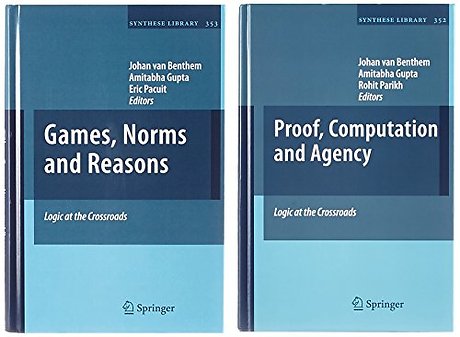Logic at the Crossroads (set)
Proof, Computation and Agency Games, Norms and Reasons
Samenvatting
Proof, Computation and Agency
Proof, Computation and Agency: Logic at the Cross Roads provides an overview of Logic and its relationship with other disciplines, and some of the emerging areas in terms. The volume brings out an inspiring paradigm, called 'Social Software', the study of patterns of social interaction by means of techniques from logic and computer science. Besides, it demonstrates how an extended view of logic can join forces with the social sciences, game theory or social choice theory, in studying patterns and procedures in social agency, and systematizing this field. Moreover, the study of Logic-Language- Cognition connection forms an important component of the fresh approach the volume.
Finally, the volume explores the nature of the contributions made in Indian tradition in logic by demonstrating that the validity of inference is not a purely formal notion and logic could be placed in the context of epistemology and the Indian scientific tradition. The book takes up Indian logic in its connections with philosophical epistemology and the philosophy of science and exhibits how topics ran naturally into each other.
Games, Norms and Reasons
The explanation as to why logic is perceived as standing at the crossroads has to do with fact that in the recent past logic, in relationship with several academic disciplines closely related to it, has been a catalyst in giving rise to new research programmes or even innovative academic fields.
Games, Norms, and Reasons: Logic at the Crossroads provides an overview of Logic and its relationship with other disciplines, and some of the emerging areas in terms of leading articles by pioneers in the field. The first part of this is devoted to exploring aspects of norms, reasons, preferences and beliefs in human agency, human interaction or structured groups, sometimes using the logic of games or by developing novel frameworks, concepts and ideas appropriate for such exploration. The papers in the second part of the volume are dedicated to Rohit Parikh who embodies some of the new trends in the explorations mentioned above that are not only seminal, but shaped the direction of a field, sometimes even creating it.
Specificaties
Inhoudsopgave
<P><STRONG>Volume II: Games, Norms and Reasons<BR></STRONG>Preface.- Introduction.- PART I.- 1. Why Meaning Intentions are Degenerate; Akeel Bilgrami.- 2. Redoing the Foundations of Decision Theory; Lawrence E. Blume, David A. Easley and Joseph Y. Halpern.- 3. A Noteon Adjusted Winner; Eric Pacuit, Rohit Parikh and Samer Salame.- 4. Modal Logic for Lexicographic Preference Aggregation; Patrick Girard.- 5. Syllogistic Logic with Complements; Lawrence Moss.- 6. Introduction to Unary Inductive Logic; Jeff Paris.- 7. From Unary to Binary Inductive Logic; Jeff Paris and A. Vencovska.- 8. Merging Information; Sujata Ghosh and Fernando R. Velazquez-Quesada.- 9. Challenges for Decidable Epistemic Logics from Security Protocols; R. Ramanujam and S.P. Suresh.- PART II.- Introduction: Tribute to Rohit Parikh.- 1. No-fi -Regret: A Connection between Computational Learning Theory and Game Theory; Amy Greenwald, Amir Jafari and Casey Marks.- 2. Why Do We Need Justification Logic?; Sergei Artemov.- 3. The Realization Theorem for S5: A Simple, Constructive Proof; Melvin Fitting.- 4. A Proof-Theoretic Approach to Mathematical Knowledge Management; Dexter Kozen and Ganesh Ramanarayanan.- 5. From Parikh's Theorem to Many-Sorted Spectra; Johann A. Makowsky.- 6. A Fresh Look at Propositional Dynamic Logic and Game Logic; Jan van Eijck and Rineke Verbrugge.- 7. Bounded Rationality: Models for some Fast and Frugal Heuristics; Horacio Arlo-Costa and Arthur Paul Pedersen.- 8. Axiom of Distinction in Social Software; Vincent F. Hendricks.- Notes on the Contributors.</P>
